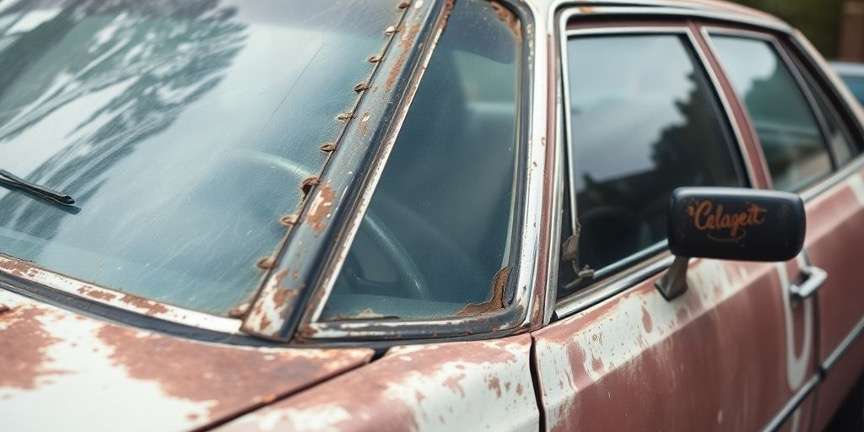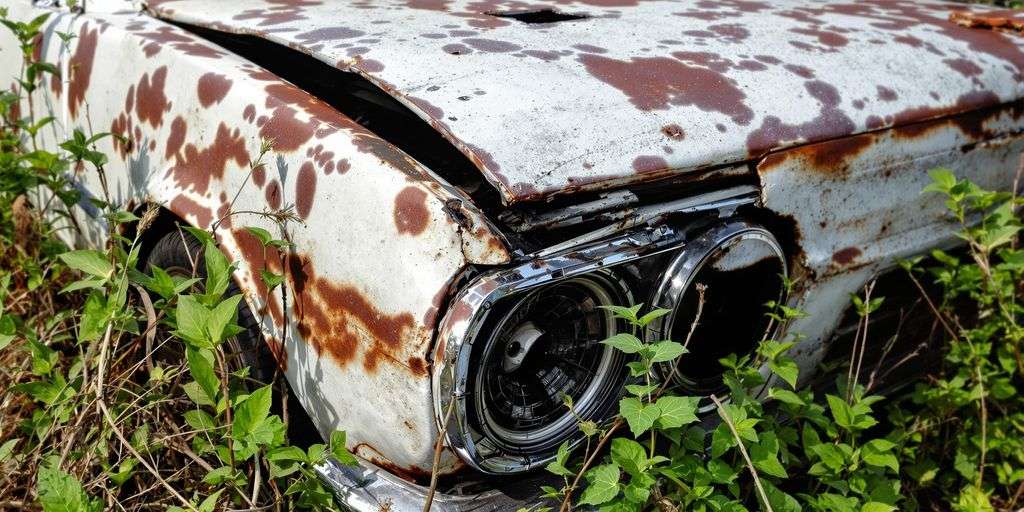Key Takeaways
- Understand the difference between salvage and junk titles before selling.
- Check your state's regulations about selling cars with salvage titles.
- Always disclose the car's condition and title status to potential buyers.
- Gather all necessary documents, including a Certificate of Destruction if needed.
- Explore different selling options to maximize your car's value.
Understanding Salvage and Junk Titles

What is a Salvage Title?
A salvage title is issued to a vehicle that has been significantly damaged, often due to an accident, flood, or other calamities, and is declared a total loss by an insurance company. This doesn't mean the car is beyond repair, but it does indicate that the cost to fix it is more than the car's worth. Salvage titles are a red flag for potential buyers because they suggest the vehicle has been through the wringer. However, some buyers see an opportunity to restore these cars, especially if they have the skills to do so themselves.
What is a Junk Title?
On the other hand, a junk title is a bit more final. When a car receives a junk title, it means the vehicle is not safe to drive and should not be on the road again. Typically, these cars are only valuable for their parts or scrap metal. They might have suffered severe damage, like a twisted frame or extensive flooding, making them irreparable. Selling a car with a junk title usually means selling it to a junkyard or dismantler.
Key Differences Between Salvage and Junk Titles
While both titles indicate a history of damage, the key difference lies in the potential for repair and road use:
- Salvage Title:
- Junk Title:
Understanding these distinctions is crucial when buying or selling a vehicle with a damaged title. It can save you from future headaches and ensure you're making informed decisions.
Legal Aspects of Selling a Junk Car with a Salvage Title
State Regulations and Requirements
When you're thinking about selling a junk car with a salvage title, it's crucial to understand that each state has its own set of rules. Some states might require you to have a title in your name before you can sell the car, while others might not. You might need to fill out certain forms, like a Damage Disclosure Statement, or even surrender your license plate. It's a good idea to check with your local DMV to know exactly what's needed. This can help avoid any hiccups when you're ready to sell.
Disclosure Obligations to Buyers
Being upfront with potential buyers about the car's salvage title is not just a good practice, it's often the law. Failing to disclose this information could lead to serious legal issues down the road. You should provide all available documents and be clear about the car's condition. This transparency helps build trust and can prevent future disputes.
Potential Legal Consequences
Ignoring legal requirements can lead to fines or other penalties. If you don't disclose the salvage title or fail to follow state-specific regulations, you could face legal action. It’s important to be aware of these potential consequences to protect yourself. Always ensure that you have the right legal documentation ready when selling your car to avoid any complications.
Preparing to Sell Your Junk Car

Gathering Necessary Documentation
Before you even think about selling your junk car, get all your paperwork ready. This includes the car's title, registration, and any other legal documents. Some states might need additional forms, like a Damage Disclosure Statement. It’s a good idea to call your local DMV to know exactly what’s required. Having everything in order will make the transaction smoother and quicker.
Conducting a VIN Check
Running a VIN check is crucial. It helps verify the car's history and ensures there are no hidden surprises. This step can reveal if the car has any outstanding liens or if it was ever reported stolen. Plus, potential buyers might want this information for peace of mind. It’s a small step that can prevent big headaches later.
Understanding the Value of Your Car
Knowing your car's worth is key to getting a fair price. Even if it's a junk car, some parts might still hold significant value. Consider removing high-value parts like GPS systems or catalytic converters before selling. Maximizing cash from junk cars often involves selling these parts separately. You can also check online listings or consult with local junkyards to get an idea of what similar cars are going for. This way, you can set a realistic price and avoid getting lowballed by buyers.
Preparing to sell a junk car might seem like a hassle, but taking these steps ensures you get the best deal possible. It’s all about being informed and ready.
Options for Selling a Junk Car with a Salvage Title
Selling to a Junkyard or Dismantler
Selling your junk car to a junkyard or dismantler is often the simplest route. These places specialize in dealing with vehicles that are beyond repair, so they know exactly what to do. Before you head over, make sure you have all the necessary paperwork, like the title or any state-required documents. Some junkyards might even accept the car without a title, but it's always good to check ahead. You'll likely need to answer questions about the car's condition, like whether it runs or what parts are damaged. Don't forget to inquire about getting a Certificate of Destruction, which releases you from any future liability.
Advertising as Parts Only
If you want to squeeze a bit more cash out of your junk car, consider advertising it as “parts only.” This approach can attract hobbyists or people looking to fix up similar models. You might advertise locally or online, offering individual parts or the whole car for a bit more than scrap value. Just be clear about the car's condition and why you're selling it for parts. A quick VIN check can help clarify this for potential buyers.
Private Sale Considerations
A private sale might fetch a higher price, but it comes with its own set of challenges. You'll need to be upfront about the car's salvage title and its condition. Transparency is key to avoiding any legal issues later on. Make sure to gather all necessary documentation and be prepared to negotiate. Some buyers might be interested in the car for its parts, while others might see it as a restoration project. Either way, having a clear understanding of your car's value will help in negotiations.
Selling a junk car with a salvage title isn't as daunting as it might seem. With the right approach, you can find a buyer who sees the value in what others might consider trash. Whether you choose to sell to a junkyard, advertise the car for parts, or go for a private sale, understanding your options will make the process smoother.
Protecting Yourself in the Sale Process
Obtaining a Certificate of Destruction
When selling a junk car, getting a Certificate of Destruction is a smart move. This document proves that the vehicle is no longer roadworthy, which can prevent future liabilities. You don't want the car coming back to haunt you if someone tries to put it back on the road. It's a safeguard that shows you've done your part to ensure the car is disposed of properly.
Ensuring Proper Transfer of Ownership
Make sure to transfer ownership correctly. This means filling out all necessary paperwork, like the title transfer and any state-specific forms. Without this, you might still be on the hook for any fines or fees if the car gets into trouble after the sale.
- Double-check the buyer's information is correct.
- Sign the title over to the buyer.
- Submit a release of liability to your local DMV.
Avoiding Common Scams and Pitfalls
The used car market can be tricky. It's full of scams and pitfalls that can catch you off guard. Here’s how to protect yourself:
- Verify the buyer's identity. Make sure they are who they say they are.
- Use secure payment methods. Cash or certified checks are safer than personal checks.
- Document everything. Take photos of the car and keep copies of all communications and agreements.
Selling a junk car can feel like a hassle, but taking these steps can make the process smoother and safer. Keep your bases covered, and you’ll avoid most of the common headaches sellers face.
Maximizing the Value of Your Junk Car
Negotiating with Buyers
When selling your junk car, negotiating can really make a difference in what you get. Start by knowing what your car is worth. Check out similar cars online and see what they're going for. This gives you a baseline. When a buyer makes an offer, don't just jump at the first one. Counter-offers are your friend. If you're selling to a junkyard, call a few different places. Prices can vary, so it's worth the extra effort to shop around.
Exploring Alternative Selling Platforms
Selling your junk car doesn't have to mean just taking it to the nearest junkyard. Consider donating your vehicle to a charity like Make-A-Wish, which can sell it to generate funds. This might not get you cash directly, but you can often get a tax deduction. Also, look into online marketplaces where people might be interested in buying your car for parts. Websites focused on car enthusiasts or DIY mechanics can be a good place to list your car.
Understanding Market Trends
Keep an eye on the market trends for scrap metal and car parts. These trends can affect how much you get for your junk car. For example, if metal prices are high, you might get more for your vehicle. Likewise, certain parts might be in higher demand at different times. Do a bit of research and try to time your sale when the market is favorable.
Remember, a little bit of patience and research can go a long way in ensuring you get the most out of your junk car sale.
Wrapping It Up: Selling a Junk Car with a Salvage Title
So, there you have it. Selling a junk car with a salvage title isn't as straightforward as selling a regular used car. You've got to know the rules, and they can vary depending on where you live. Make sure you have all your paperwork in order, like the title and any necessary disclosures. If you're thinking about selling it for parts, double-check what the buyer means by ‘parts only' to avoid any mix-ups. And don't forget to run a VIN check to know exactly what you're dealing with. At the end of the day, whether you're selling it to a junkyard or a private buyer, being upfront and honest is key. It might take a bit more effort, but it'll save you headaches down the road. Good luck with your sale!
Frequently Asked Questions
What is a salvage title?
A salvage title is given to a car when an insurance company says it's too damaged to drive safely. However, you might be able to fix it and get a new title if it passes inspection.
What is a junk title?
A junk title means a car is so damaged it can't be fixed to drive again. It's only worth selling for parts or scrap metal.
Can you sell a car with a salvage title?
Yes, you can sell a car with a salvage title, but you need to tell the buyer about the title and its condition.
What's the difference between a salvage and a junk title?
A salvage title might mean the car can be repaired and driven again, while a junk title means the car is only good for parts and scrap.
Do I need a title to sell my junk car?
In most places, you need a title to sell your junk car. Check local rules to be sure.
How can I get the best price for my junk car?
To get the best price, compare offers from different junkyards, and make sure you have all the needed paperwork ready.



